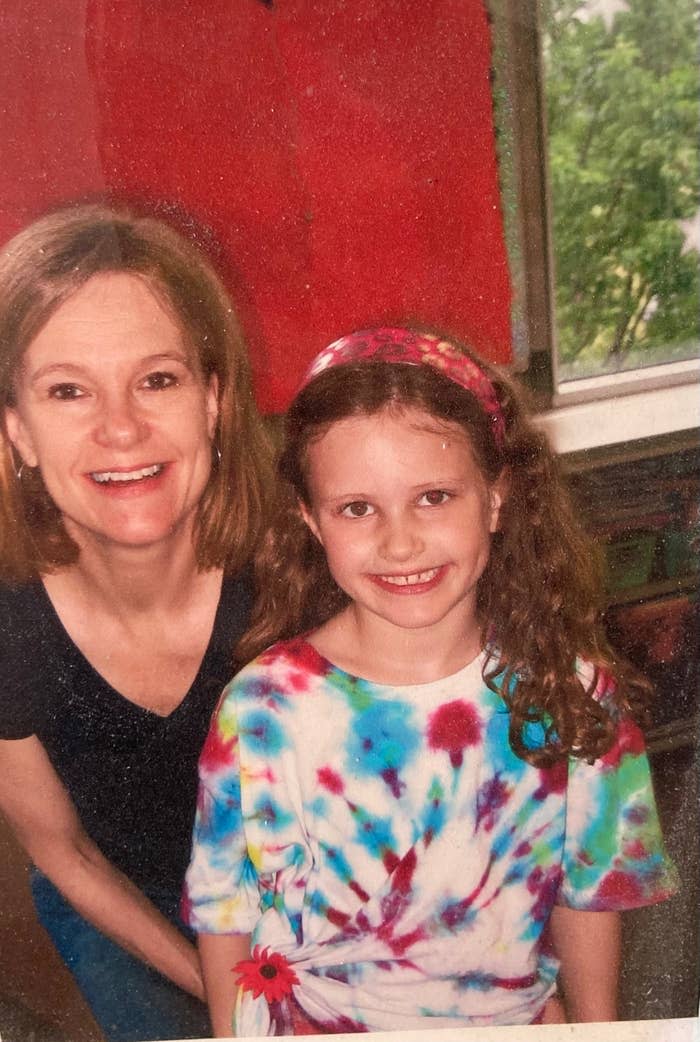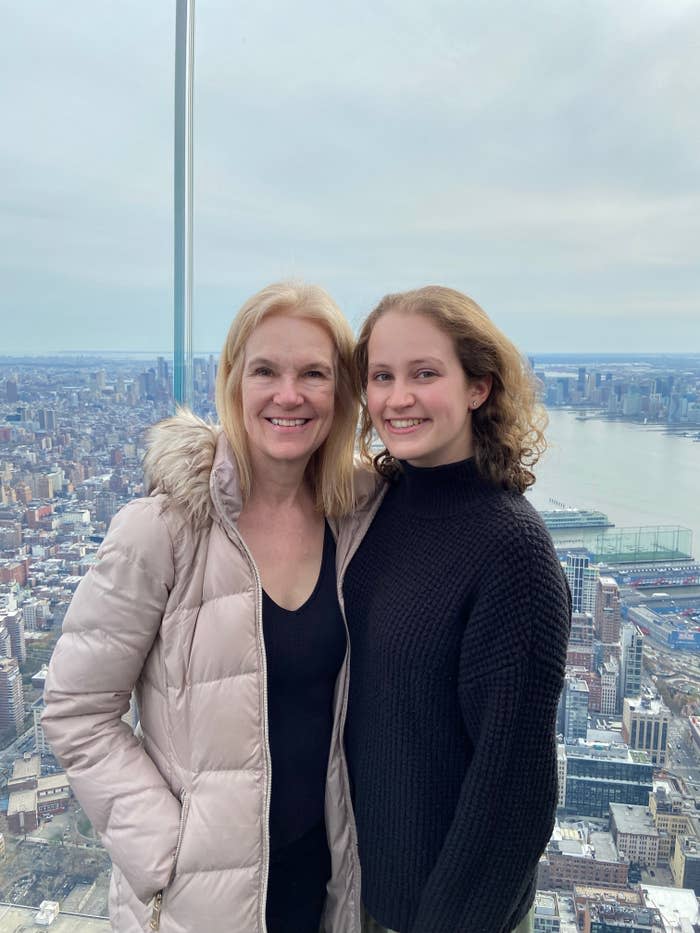I Thought I Knew My Mom. Then I Found A Grainy Polaroid That Forced Me To Reconsider.

The author (right) and her mom at her elementary school, where her mom frequently volunteered (2009).
A few weeks before moving out of my parents’ house for college, I stumbled upon a grainy Polaroid of my mom in her 20s. I stared, dumbfounded, as two questions formed in my mind. First, who was this person? And second ― why didn’t I know her?
The mom I knew threatened to divorce my dad frequently and required me to wear camisoles under shirts to cover my stomach. We fought often about when I could hang out with friends, and where, and for how long. She also stayed meticulously up to date on my life by insisting I catalog every minute of it in a ritual I called Tell Me About Your Day. It went like this:
“So, tell me about your day. What happened in first period? Did you talk to Mr. Gallaher like I asked you to? What about the book report, did you turn it in? OK. What did you do in second period? Nothing? Come on, what topic are you learning? Did they assign homework? OK, I want to print the assignment description.”
As I grew older, this questioning felt like endless nagging at the end of a long day. I began approaching the conversations like interrogations to be endured. I didn’t appreciate that my mom wanted to be involved in my life. Instead, I saw Tell Me About Your Day as part of a wider pattern in which she tried to control me.
For instance, in middle school, when my mom overheard my friends’ parents using my chosen nickname, Jackie, she yelled, “Don’t call her that!” and lectured them on why the name was “trashy.” Similarly, she disapproved when I wore makeup or anything form-fitting. Being told to cover up made me feel uncomfortable in my body and ostracized from peers who wore what they wanted. I began to rebel by changing into prohibited outfits at school.
As an adult, I recognize how my mom’s role as the primary authority in our home made it easier to reduce her to a rigid micromanager. While my dad traveled for work, my mom was constantly around. The sheer amount of time she spent with me made her the parent who enforced rules and also the parent most likely to annoy me.
But this awareness did not come until later. Back then, I simply complained, until one day, when I was 16, I decided that I wouldn’t do Tell Me About Your Day anymore. No. The first time I refused to describe my day, the word thudded like a heavy book on a table. My mom protested for a while before she lost track of how many summaries I owed her and focused on my siblings.
From then on, I wielded the power of a no. When my mom tried to convince my teenage siblings and me to read children’s books with her — no. When she begged us to create Pinterest crafts for holidays and birthdays well into adulthood — no. The knowledge that she couldn’t force me to do anything I didn’t want to do was freeing.
However, exercising this right came at a price: I was now an outsider in my own family. Passing through our kitchen, I’d catch glimpses of my brother, sister, and mom cuddled together on our couch watching a travel documentary. I’d feel a dull longing for intimacy, but after a series of my nos, Mom had stopped asking me to join them.
I felt as if I were peering at a misty landscape from a distance, wishing to cross a lake to reach the shore yet knowing I had no oars to paddle. I missed being involved in my family landscape, but by that point, I had been moored for so long that I was afraid to disturb the water.
This distancing didn’t help me add to my meager knowledge of my mom’s pre-kids life. Ironically, although she noted every minute detail of my life, my mom rarely shared stories about her own childhood or young adulthood. Her reticence was overcome only by her annual remarks about the anniversaries of her parents’ deaths, and she never mentioned her sister, whom I haven’t seen in over a decade, or her brother, whom I’ve never met. And every time I commented on what seemed like a less-than-perfect marriage to my dad, she changed the subject. My mom protected these topics with her own implicit nos ― shrugging, evasive language, silence.
So, when I found the photo of her at my age, looking carefree and lovestruck, it felt like seeing a flash of light rebound off a mirror. In the image, my dad grins at my mom through round glasses, and she reclines in a large leather chair, her shoulders scrunched up in laughter as if she and my dad are sharing a hilarious inside joke. She’s even wearing a crop top!
I had to know more to make sense of it. I wanted to show the photo to everyone and beg for more information, but I knew my dad, a private person, would be upset if the picture were shared. Instead, I asked him questions under the guise of a college assignment, and his answers shocked me. I learned that my mom worked in Finland, frequented Chicago’s jazz clubs with my dad, and loved living in Colorado. Listening to my dad talk, I imagined my mom as an easygoing voyager, exploring the world and carving out her place in it.
After months of building the courage to talk to my mom directly, I discovered the details of how she had watched both her parents die, on her own. She called 911 when her dad collapsed from a heart attack, but the ambulance arrived too late. She was 17. Years later, one August, she took a semester off grad school to care for her ailing mother. By Christmas, cancer had taken my mom’s only remaining parent.
With these revelations, suddenly I saw my mom as a complex woman who had survived unthinkable trauma, and I better understood her desire to learn everything about my life. When both of your parents are stripped away with little warning, of course you cling to the people you have left. I thought about all the ways my mom expressed love that I had disregarded, blinded by teenage frustration.
At 23, I feel guilty about distancing myself from her. With her parents dead, she stands on a shore of her own with no way to paddle closer to them except by imperfect remembrance. I don’t want to stand on that untraversable shore any earlier than necessary. And when the time does come, I want to remember more than just my mom’s rules. I want to know real stuff ― her dreams, the places she’s lived, the people she’s loved, and the sacrifices she made.

The author on a viewing platform with her mom during one of her New York visits (April 2023).
The first step required closing the distance between me and my mom. Now that I’ve grown up and can dress however I want and go by any nickname I like, I find myself reaching for my phone to call her more. I followed my sister’s lead and started intentionally scheduling one-on-one time with my mom to go on bike rides or explore my Pittsburgh hometown.
Last April, my mom visited me in New York. At a fancy restaurant, I said, “So many weddings must happen here.”
My mom’s face wrinkled as she shared that her mother used to work as a bridal consultant helping women find wedding dresses. It was another flash of unexpected learning, and I listened raptly, feeling like I was with the woman in the photograph. Maybe that woman was always there; I just hadn’t noticed.
I wonder now how much of my limited knowledge of my mom’s past results from my lack of asking. Who was she? Who might she still become? How has saying no precluded the chance of knowing her more deeply?
These are much more difficult questions than my mom’s queries about homework. These questions require an openness between us that may be painful. They emerge from the fundamentally unequal relationship between parents and children: While parents witness every stage of their children’s lives from prenatal growth to adulthood, children know their parents only as caregivers. For many of us, this means we wake up one day and realize that we don’t know the people they are outside of parenthood. But there’s so much to discover.
I’ve apologized to my mom for some things in the past; she’s done the same, and now our relationship is stronger than ever. (The main thing we fight over is when I write about her – sorry, Mom).
Mostly, I’m thankful I’m no longer standing on that impassable shore, peering at my mom through the mist. I haven’t asked all the hard questions yet, but I’m proud that I’ve grabbed an oar and rowed closer to her.
Jacqueline LeKachman is a New York-based freelance writer and English teacher who has contributed to The Washington Post, WIRED, Business Insider, and Shondaland. She is writing a book about complex family dynamics and can be found on Twitter @JacquelineLeKa.
This article originally appeared on HuffPost.

 Yahoo Lifestyle
Yahoo Lifestyle 
